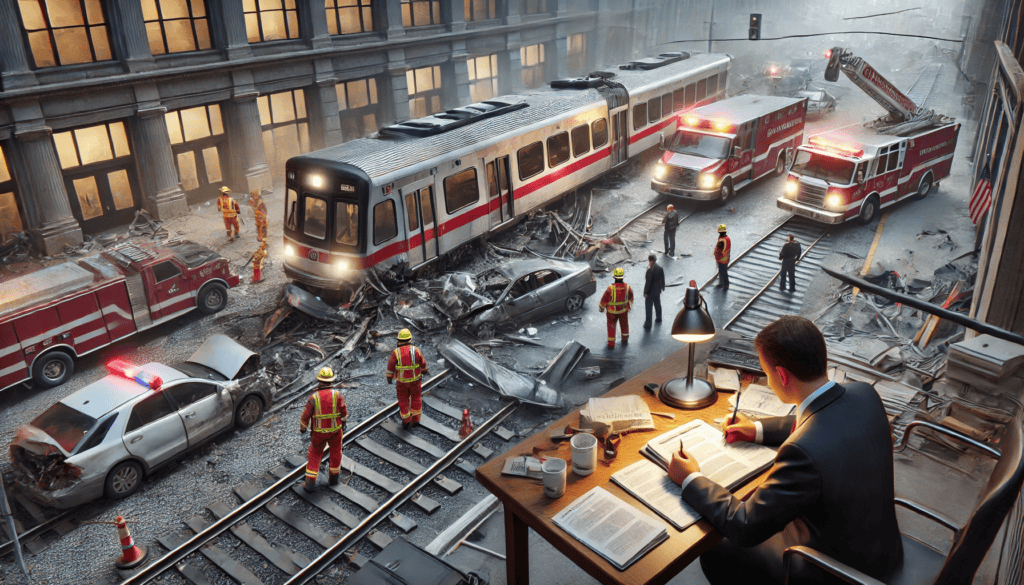Rail Transport Litigation Expert Testimony in Transit Litigation

The Importance of Expert Testimony in Rail Litigation
Rail litigation involves a complex interplay of technical knowledge, regulatory compliance, and legal expertise. In cases where rail accidents, safety breaches, or operational disputes arise, expert testimony becomes a crucial element in the courtroom.
This article explores the importance of expert testimony in rail litigation, detailing the role of expert witnesses, their key qualities, and their impact on legal outcomes. We will delve into various aspects of rail litigation, the contributions of rail transport litigation experts, and the significance of thorough rail accident investigations.
Overview of Rail Litigation
Rail litigation encompasses many cases, including accidents, safety violations, contractual disputes, and regulatory compliance issues. These cases often involve significant stakes, both in terms of financial implications and public safety concerns.
Common issues in rail litigation include derailments, collisions, infrastructure failures, and breaches of safety protocols. The consequences of these incidents can be severe, leading to loss of life, environmental damage, and substantial financial liabilities.
The complexity of rail systems and the technical nature of these cases necessitate the involvement of experts who can provide in-depth analysis and testimony. This is where the role of expert witnesses becomes indispensable.

Role of Expert Testimony
Expert testimony is fundamental to rail litigation. It bridges the gap between technical intricacies and legal arguments. An expert witness in rail litigation provides specialized knowledge and objective analysis that can help the court understand complex issues.
These experts offer insights into industry standards, safety protocols, operational procedures, and the specifics of the incident.
Examples of Light Rail Expert Testimony:
- In a case involving a light rail collision, the expert might testify about the design and maintenance of the rail vehicles, the signaling systems, and the adherence to safety standards.
- In disputes over contractual obligations for rail construction projects, an expert can clarify the technical requirements and industry norms that were expected to be met.

Key Qualities of Effective Expert Witnesses
Effective expert witnesses possess several key qualities that make their testimony credible and impactful:
Expertise and Experience:
- Extensive knowledge and experience in the rail industry are crucial. This includes familiarity with rail operations, safety standards, and regulatory requirements.
- An expert witness should have a proven track record in their field, supported by relevant qualifications and professional credentials.
Communication Skills:
- The ability to convey complex technical information clearly and understandably is essential. Expert witnesses must be adept at explaining intricate details to judges, juries, and attorneys who may not have a technical background.
Credibility and Impartiality:
- Credibility is built on a foundation of impartiality and objectivity. Expert witnesses must provide unbiased analysis and refrain from advocating for one party over another.
- Thorough preparation and comprehensive documentation further enhance their credibility.
Preparation and Documentation:
- Detailed preparation involves reviewing all relevant materials, conducting independent analyses, and compiling comprehensive reports.
- Proper documentation ensures that the expert’s findings are well-supported and can withstand scrutiny during cross-examination.

Case Studies
These case studies draw on elements that are seen in real cases, but they remain entirely speculative and are used for educational and illustrative purposes.
Case Study 1: Rail Accident Litigation In a notable derailment case, the rail transport litigation expert’s testimony was pivotal. The expert conducted an extensive rail accident investigation, examining track conditions, vehicle maintenance records, and signaling systems. Their analysis revealed that inadequate maintenance practices contributed to the derailment. The expert’s detailed testimony helped the court understand the technical failures and assign liability appropriately.
Case Study 2: Safety Compliance Dispute In another case, a light rail operator faced allegations of non-compliance with safety standards. The rail industry expert witness provided testimony on industry best practices and regulatory requirements. Their testimony demonstrated that the operator had indeed implemented necessary safety measures, leading to a favorable outcome for the defense.
The Process of Selecting Expert Witnesses
Selecting the right expert witness involves several critical steps:
Criteria for Selection:
- Relevant expertise and experience in rail operations or safety being litigated.
- Strong professional reputation and a history of providing reliable expert testimony.
Vetting and Hiring:
- Thoroughly vetting potential experts by reviewing their qualifications, previous testimony, and professional conduct.
- Conducting interviews to assess their communication skills and ability to articulate complex concepts.
Matching Qualifications to Case Specifics:
- Ensuring that the expert’s qualifications align with the technical aspects of the case.
- Select an expert whose background and experience directly relate to the litigated issues.
Challenges Faced by Expert Witnesses
Expert witnesses often encounter challenges when providing testimony in rail litigation:
Technical Complexity:
- The technical nature of rail systems and operations can make it difficult to explain concepts in layman’s terms.
- Overcoming this challenge requires simplifying complex information without losing accuracy.
Cross-Examination:
- Expert witnesses must defend their analysis and conclusions against rigorous questioning during cross-examination.
- Maintaining composure and credibility under pressure is crucial.
Maintaining Impartiality:
- Experts must avoid the appearance of bias and ensure their testimony remains objective and fact-based.
- This involves refraining from advocacy and focusing solely on providing accurate information.
Conclusion
Expert testimony is vital in rail litigation, providing the technical insights necessary for informed legal decisions. Rail transport litigation experts, light rail expert witnesses, and rail industry expert witnesses contribute significantly to resolving complex legal disputes.
Their expertise, communication skills, and credibility are essential for ensuring that technical issues are accurately presented and understood in court.
Final Thoughts: The importance of expert witnesses in rail litigation cannot be overstated. Their ability to analyze, interpret, and convey complex information helps ensure that justice is served. As rail systems continue to evolve, the role of expert witnesses will remain critical in addressing the challenges and complexities of rail litigation.
References and Further Reading
- Books:
- “The Law of Railway Operations” by Charles F. James
- This book covers the legal framework governing railway operations and the importance of regulatory compliance in the rail industry.
- “Forensic Engineering: Damage Assessments for Residential and Commercial Structures” by Stephen E. Petty
- While not specific to rail systems, this book provides insights into forensic engineering techniques and the role of expert testimony in litigation.
- “The Law of Railway Operations” by Charles F. James
- Articles:
- “The Role of Expert Witnesses in Railway Accident Investigations” – Journal of Forensic Sciences
- This article explores the critical role that expert witnesses play in investigating railway accidents and providing testimony in court.
- “Legal Issues in Railway Operations” – Transportation Law Journal
- A detailed examination of the legal challenges faced by the rail industry and the importance of expert witnesses in resolving these issues.
- “Best Practices for Railway Safety Compliance” – Rail Safety Magazine
- This article discusses best practices for ensuring safety compliance in railway operations and the role of experts in maintaining safety standards.
- “The Role of Expert Witnesses in Railway Accident Investigations” – Journal of Forensic Sciences
- Websites and Online Resources:
- Federal Railroad Administration (FRA) – www.fra.dot.gov
- The FRA’s website provides extensive resources on railway regulations, safety standards, and compliance requirements.
- American Public Transportation Association (APTA) – www.apta.com
- APTA offers a wealth of information on public transportation, including light rail systems, safety protocols, and industry standards.
- National Transportation Safety Board (NTSB) – www.ntsb.gov
- The NTSB’s website includes detailed reports on railway accidents and investigations, highlighting the role of expert analysis.
- Federal Railroad Administration (FRA) – www.fra.dot.gov
- Case Studies:
- “The Washington Metro Collision: Lessons in Safety and Expert Testimony” – Case Study by the NTSB
- An in-depth analysis of the Washington Metro collision, focusing on the investigation process and the role of expert witnesses in determining the causes of the accident.
- “The San Francisco Light Rail Accident: A Comprehensive Legal and Technical Review” – Case Study by Rail Safety International
- This case study provides a detailed review of a significant light rail accident in San Francisco, emphasizing the importance of expert testimony in the legal proceedings.
- “The Washington Metro Collision: Lessons in Safety and Expert Testimony” – Case Study by the NTSB
By exploring these sources, gain a deeper understanding of the complexities of rail litigation, the vital role of expert testimony, and the best practices for ensuring safety and compliance in the rail industry.

With over forty years in public transit, Timothy Borchers is a preeminent international transit and light rail expert witness specializing in accident investigation, system safety, and industry compliance. He regularly authors authoritative articles on advanced light rail topics.

